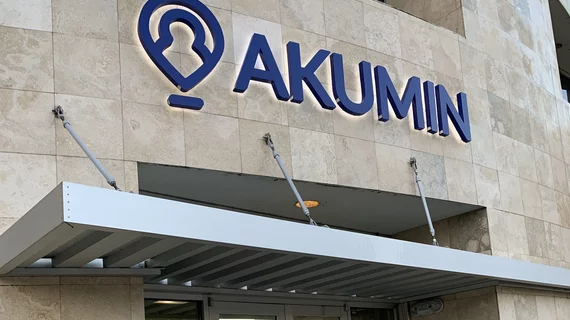Radiology provider Akumin breaks long radio silence after emerging from bankruptcy
In one of its first publicly announced moves since emerging from bankruptcy in February, radiology provider Akumin is launching new “relocatable and expandable” imaging centers to be deployed across the U.S.
“Akumin AXIS” units are fully equipped with 9-foot ceilings, an open layout and flexible design elevated 8 inches off the ground. The Plantation, Florida-based company said the movable centers can offer a wide range of imaging capabilities including PET/CT, radiation therapy (linear accelerators) and MRI (which won’t be available until 2025).
“Our commitment to enable care providers to improve healthcare delivery drives us to develop tailored solutions like these that enhance access to imaging and oncology services," Akumin CEO Krishna Kumar, MBA, said in a Nov. 20 announcement.
Akumin AXIS Expandable Patient Solutions is geared toward both hospitals and physician groups and can deliver one or multiple modalities. The company noted that providers are facing rising demands for imaging services, alongside high capital costs for expansion, construction delays, and staffing shortages. It also highlighted PET/CT capabilities, with three uptake rooms for injection of radioactive tracers and theranostic infusions.
“The solution supports hospitals and physician groups with space and budget limitations, providing a cost-effective alternative to traditional construction,” Akumin said in the announcement. “Unlike modular buildings, Akumin AXIS is fully relocatable, allowing hospitals to adapt services as patient needs evolve. With setup options on an existing mobile pad or minimal infrastructure, this solution enables facilities to expand services swiftly and sustainably.”
Akumin noted that it has partnerships with about 1,000 healthcare providers and physician groups in the U.S., including 23 large hospital systems. The company emerged from Chapter 11 bankruptcy protection in February after successfully deleveraging from its debts, which had totaled $470 million at the time of the filing in October 2023. Once a publicly traded entity, Akumin has now delisted from the Nasdaq and Toronto Stock Exchange, with alternative investment firm Stonepeak operating as sole owner.
After completing the bankruptcy process, Akumin has remained silent, not posting a news announcement since appointing Kumar as its new leader in February. Nine months later, the company announced the new portable solution, alongside a partnership with United Imaging unveiled Nov. 18. With the latter, Akumin is transforming its Plantation, Florida, location into a new radiology “command center” and “center of excellence.”
R. Jeffrey White, MBA, the Akumin contact listed on both company news announcements this week, was asked to comment on the long radio silence since February.
“The new leadership team at Akumin that has been in place since the go-private transaction has been working hard to optimize the platform for success, including improved service delivery, accelerating mobile radiology growth and forging new partnerships as may have gleaned from the recent press releases,” White, Akumin's director of corporate development and investor relations, told Radiology Business by email Wednesday.

